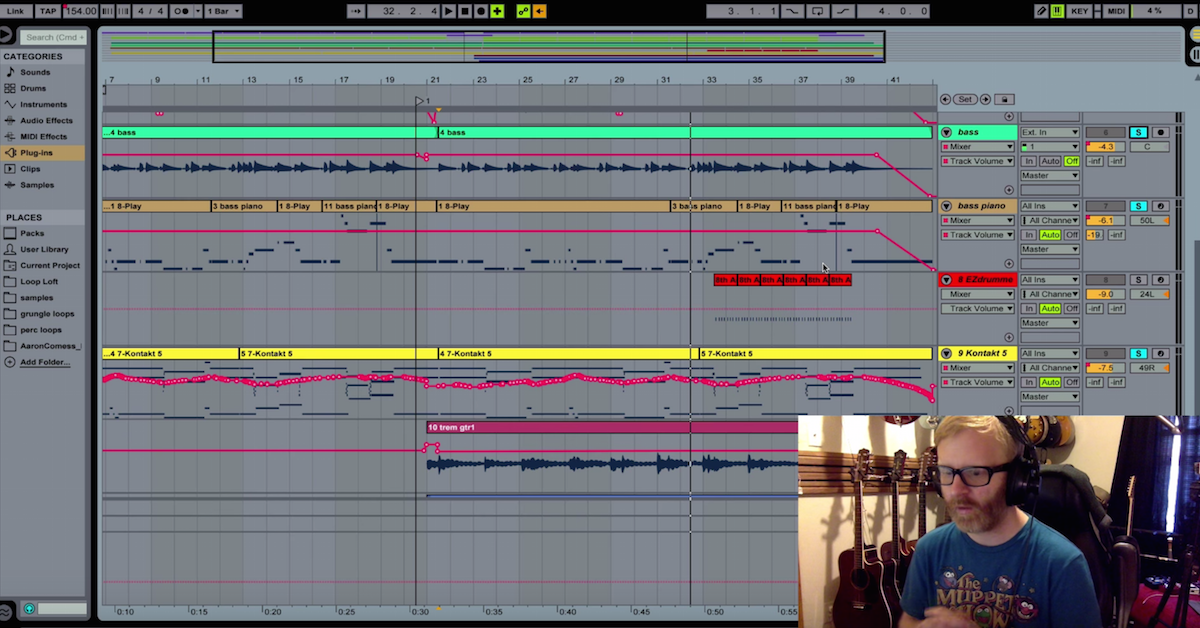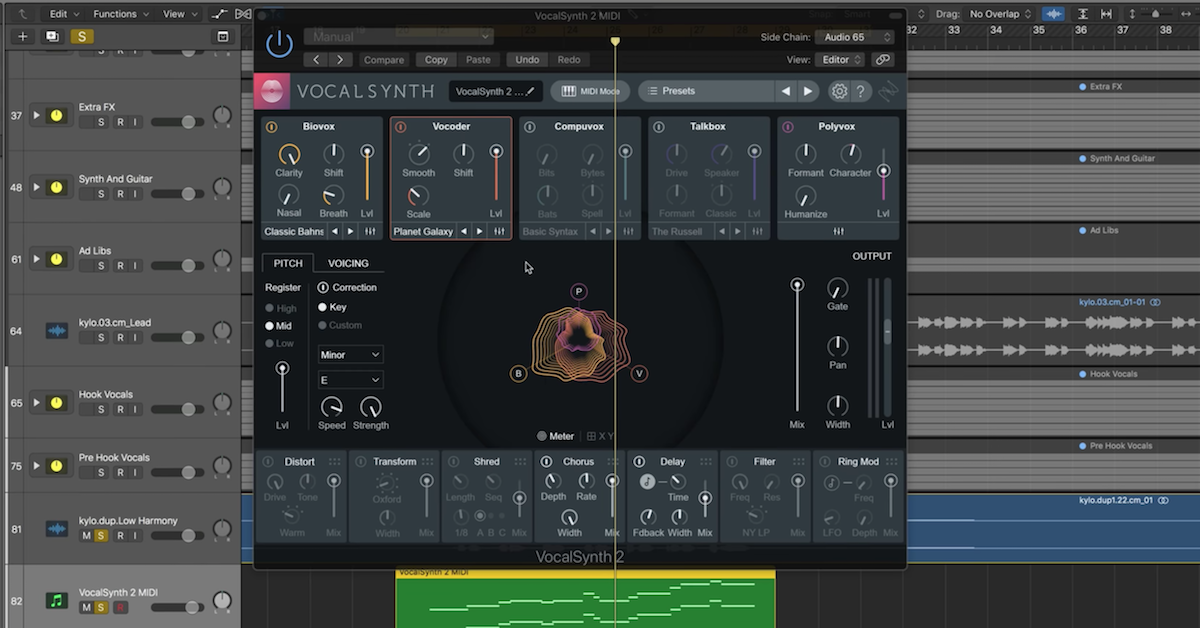72 Music Production Tips I Wish I Knew When I Started
Article Content
Dear Past Zac,
The year is 2015. I … well you, are older.
In time, you’ll release two original EP’s on iTunes. You’ll get a remix and an original release published on Beatport. You’ll compose, arrange, and produce hundreds of tracks.
You’ll use Kickstarter to create two successful albums and print physical copies. You’ll have people commenting on YouTube how much they like your music. You’ll love your music.
You’ll hate your music. You’ll continue to struggle with self doubt but with better finesse. The ebb and flow doesn’t ever leave.
As you listen in amazement and wonder to “Move For Me” by Deadmau5 and Kaskade in your new Sony MDR-7506’s — which you’ll use for over five years — I want you to take heed of what I’ve learned over time.
Here’s 72 tips I wish I knew when I started producing:
—
1. Trust your taste. In other words, don’t second guess yourself. Who are you doing this for anyway?
2. Stop crapping on popular music for your ego. You can learn from anything. In fact, it’s wise to learn from music that millions listen to.
3. Using loops doesn’t make you a “fake” artist. It’s the end product that counts. Look at the gaming industry. Do you know how many of them use Unity? Or Unreal? What matters is the game. What matters is the music.
4. Same goes with samples.
5. Having a beverage while you produce will make the process much more fluid. Arguably it’s the caffeine. Arguably it’s having something to reach for in between empty moments.
6. Get a nice pair of headphones or monitors ASAP. Frequency response is important. Bass is important.
7. Mixing is not mysterious judo. Go ahead and mix. Make bad mixes. Eventually, you’ll make good mixes.
8. Mastering is not mysterious judo. Go ahead and master. Make bad masters. Eventually, you’ll make good masters.
9. Buy a quality sample pack as soon as possible. Here are some quality packs incuding a free one.
10. Let music you don’t like or understand warm up to you. Chances are you’ll dig it once it’s familiar.
11. Repetition is important and minimalism is key but don’t use these as an excuse to ignore that last 20% of polish. Give your tracks that spit shine sheen.
12. No one cares until they do. Work on your craft and put it out.
13. If there’s no market for your work they may never care. Do you care?
14. If you don’t enjoy listening to your music you’re doing something wrong (or working for hire).
15. Start building a reliable way to connect with people who want your music. Email list is a good idea.
16. Free shouldn’t literally mean free. Give it out for a purpose. Facebook likes? SoundCloud followers? Email subscribers?
17. Think about where people will listen to your music. What is the setting? This should inform your production.
18. Think about what people will listen to your music. Who are they? This should inform your production.
19. Don’t resist learning music theory. Music theory is a map. You can navigate without it but it’s handy to have.
20. Don’t compare yourself too much to professional artists. Especially not early on.
21. DO aim for the quality of these pro artists. But again, do not let them stunt you.
22. You’ll reach a point where your music is actually on par with professionals and you’ll only recognize it looking back.
23. It doesn’t matter what DAW you use.
24. The final production is what matters — not how it’s made.
25. I repeat. The final production is what matters — not how it’s made.
26. Don’t ever make excuses with regards to tools. You can make amazing music with 100% free software. Remember that $400 you spent on synths that Deadmau5 was known to use? You’ll use those for about two songs.
27. New tools do provide opportunities for new directions. Spice up your production once in a while by acquiring a new plugin, sample pack, or instrument.
28. You know that guitar you’ve played for half your life? Stop pretending you don’t want to use it and get an interface. I recommend this one.
29. Invest in a solid microphone to go with that interface. I recommend this one.
30. There are four tiers of audio equipment.
- Cheap
- Solid enough for pro use. Consumer level pricing.
- “Pro” which is marginally better than number 2.
- Expensive.
Tier two is good enough. Ignore the rest. When you make a living off of music you can splurge.
31. Never get angry or upset at change. People who yell about the music industry crumbling or that streaming is taking over the world are exhibiting resistance. Accept the world for what it is and look for opportunities. The obstacle is the way.
32. Deadmau5 began his production journey around age 16. He exploded 14 years later. Mostly because of market conditions. Kaskade’s “active years” according to Wikipedia begin in 1989. Aim for the slow burn not overnight success.
33. Start building up a following now. Fan by fan. Never forget the power of one more fan. One more listener. One more email subscriber.
34. You don’t need a million twitter followers to be a success. All you need is one thousand true fans. This may not literally be one thousand.
35. Treat your music promotion like a boot-strapped blog. It’s surprisingly analogous.
36. Your side project of writing and your eventual day job as a game designer will provide incredible perspective on making art. This will inform your music. Vary yourself.
37. Compression is overrated.
38. EQ is overrated.
*Clarification: Compression and EQ are nothing more than hammers in your toolbox. Learn how to wield them. Use them to get the job done.
39. In fact, most technical aspects of production are overrated. Focus on the emotion and the energy. You’ll write a book about this.
40. If you’re sitting on unreleased music for two or more years consider licensing it. Sell the beats. Do something with it. Chances are you’ll just sit on them anyway.
41. Vocals are like cheat codes for engagement and interest in your track.
42. Provide value to others. In time, they’ll provide value to you.
43. The people I’ve seen have the most success do it by physically knowing and interacting the most. Playing the game online can work but it’s harder because the barrier of entry is lower — everyone is doing it, and it’s far less personal.
44. Ignore vanity metrics like “number of tracks” or “song length.” These have no bearing on the final quality of the song.
45. As Rolf Potts says in his book “Vagabonding” about world travel, “If in doubt about what to do in a place, just start walking.” Similarly, if you get stuck with a piece just start messing around. Eventually what you’re looking for will find you.
46. Break all the rules. On purpose. Make this a dedicated effort. You’ll learn why they exist and how malleable they really are.
47. Label and name your tracks and project files. It really really really helps when revisiting things. You still won’t do this even if I tell you to.
48. Never ever export a song and call it “final.” That’s a slippery slope.
49. Use [track name]_[purpose]_[date] where purpose is something like “mix” or “mastered” or “demo” or “forJuan.”
50. You appreciate production more during periods of your life when it’s your escape. I know you want to drop everything and produce but understand it will lose some allure. Opportunity cost is a fiend.
51. Your speakers can deteriorate overtime. This will cause you to remaster an album 8 times in the future. Trust your monitors yet be diligent that their time may come.
52. The real important difference between analog and digital equipment is the ability to play and touch analog. Not quality.
53. In the absence of analog equipment, get a MIDI keyboard with knobs, wheels, and faders if possible. At least knobs.
54. Your family genuinely enjoys listening to your music. Share it with them.
55. You know your friends genuinely enjoy your music if their play count is more than two.
56. If you want to make a big diversion or edit in your track do a “Save As” and name it “[track name]_[reason for edit].” Then feel free to make changes. You can always go back to the initial file.
57. Keep volume at a decent level. No reason to blow your head off.
58. Make sure you check your mixes when the track is loud and when the track is quiet.
59. When the track is quiet you should be able to hear the most important parts of your track clearly.
60. Mixing is 90% volume and 10% remembering it’s mostly volume.
61. Mastering is 90% volume and 10% fixing your mix.
62. Back up your music. Dropbox didn’t exist when you started so grab an external hard drive. Losing your work is awful.
63. Never let dollars impede your creative progress.
64. Producing on a laptop is less enjoyable than having a bigger screen. Get the iMac instead of the Macbook. Or, buy a display for your laptop. Regardless, you’ll use a 13-inch MacBook for awhile.
65. If you’ve spent more than 5 minutes adjusting a parameter you’ve lost objectivity. Set it and come back later. Preferably another day. Or after you’ve substantially disengaged from production.
66. You’re not gonna become famous by creating some crazy new synth patch. Each piece serves the whole.
67. You can’t force your voice. You’ll stumble and mimic your way to a point where your voice begins coming through. Let it. Be vulnerable. Trust your choices. Eventually it comes out.
68. There is a difference between a track you casually throw up on SoundCloud and something you’ve officially released. Put care and value into your releases. People respond to this.
69. Find someone to do visual design for you. Album covers, web design, logos, etc. — they’re all important for creating a holistic experience and meeting audience expectations. Most people don’t do this which means you should.
70. Always pay for visual art. If the person declines compensation buy them lunch. If they won’t take lunch yell at them.
71. Whenever you struggle or doubt yourself remember why you got into this in the first place. Making music is fun. If you’re struggling you’ve forgotten the fun.
72. Sometimes the fun isn’t there. Go do something else.
—–
Well, Past Zac, I hope you’ve learned something.
If anything, you’ve learned that there’s a vast, unknown, and exciting world of music creation ahead of you. There’s tons to learn.
And let me tell you, it never gets old.
In the comments below, share what you wish you knew when you started producing.
Furthermore, if this kind of material excites or interests you, click here to check out my book: Electronic Music Arrangement: How to Arrange Electronic Music.





